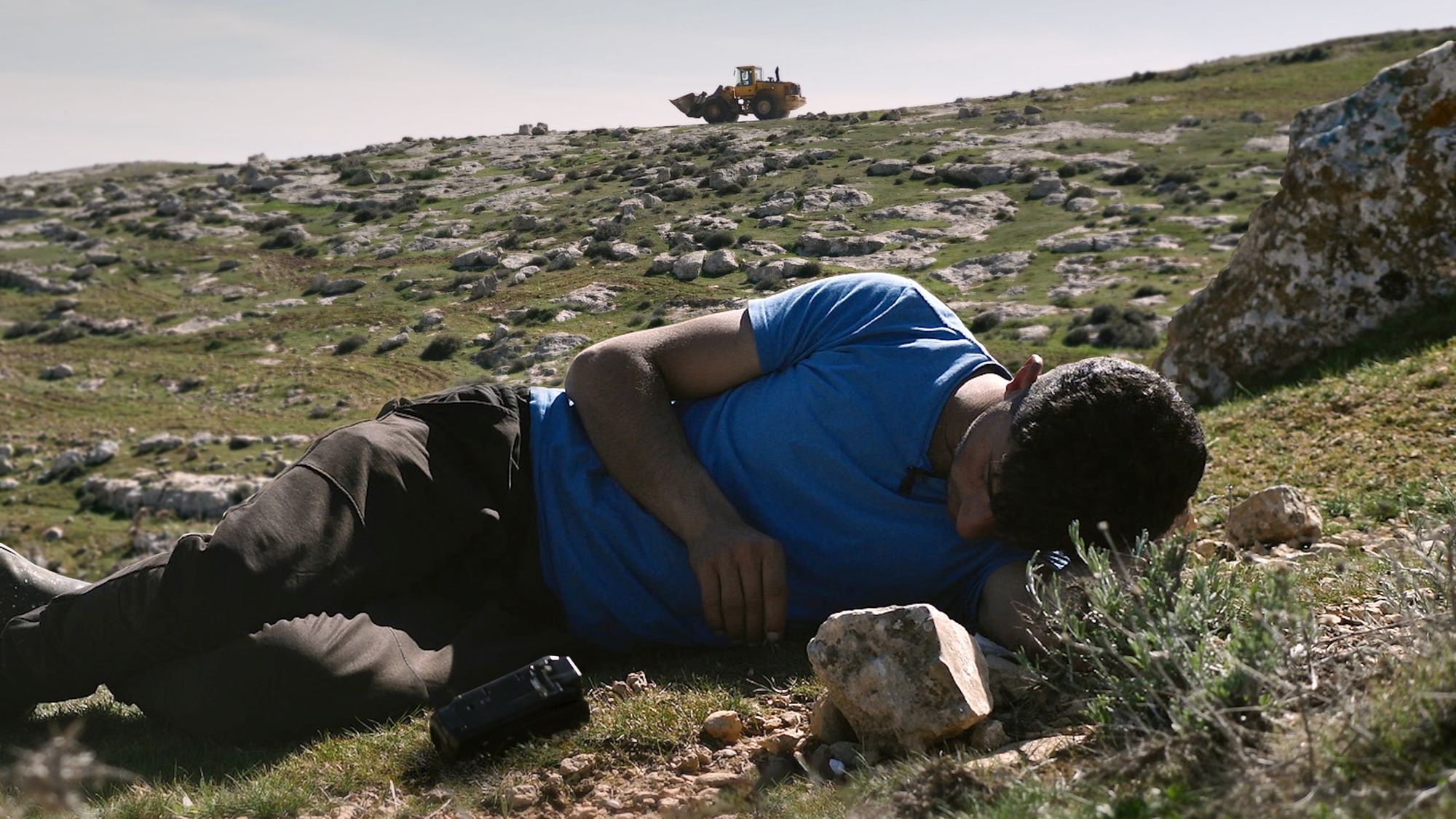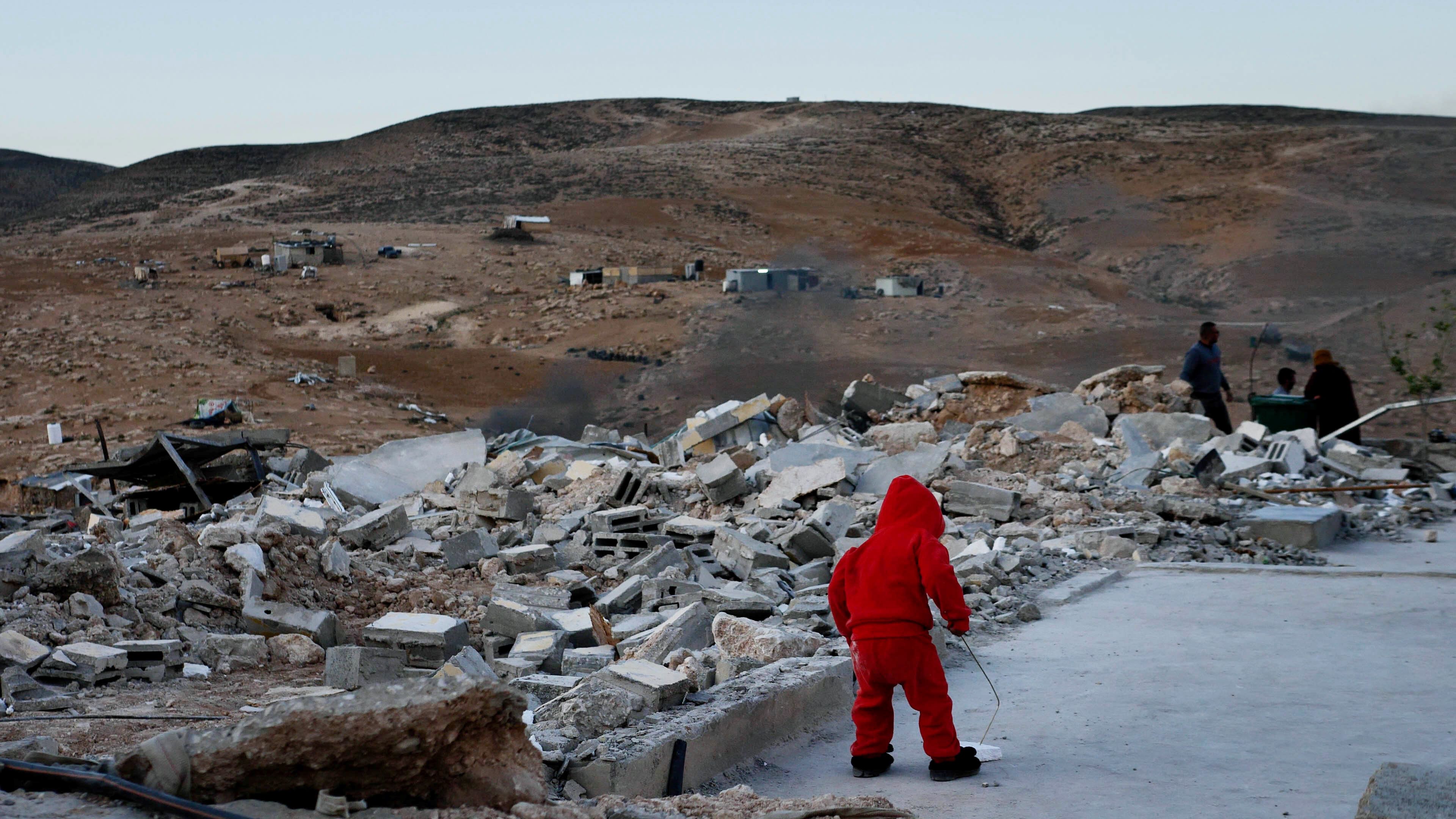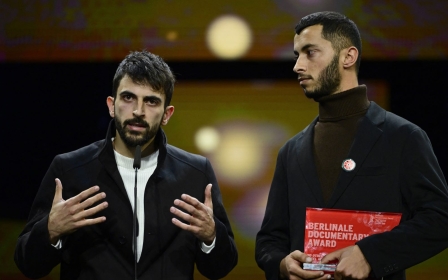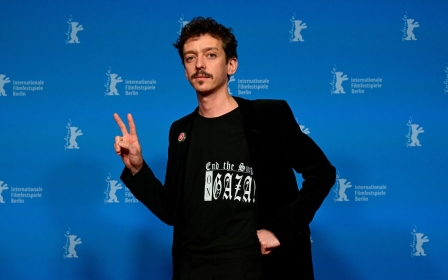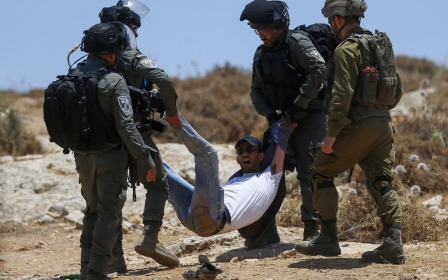No Other Land: An Israeli-Palestinian duo fight to expose apartheid as war rages in Gaza
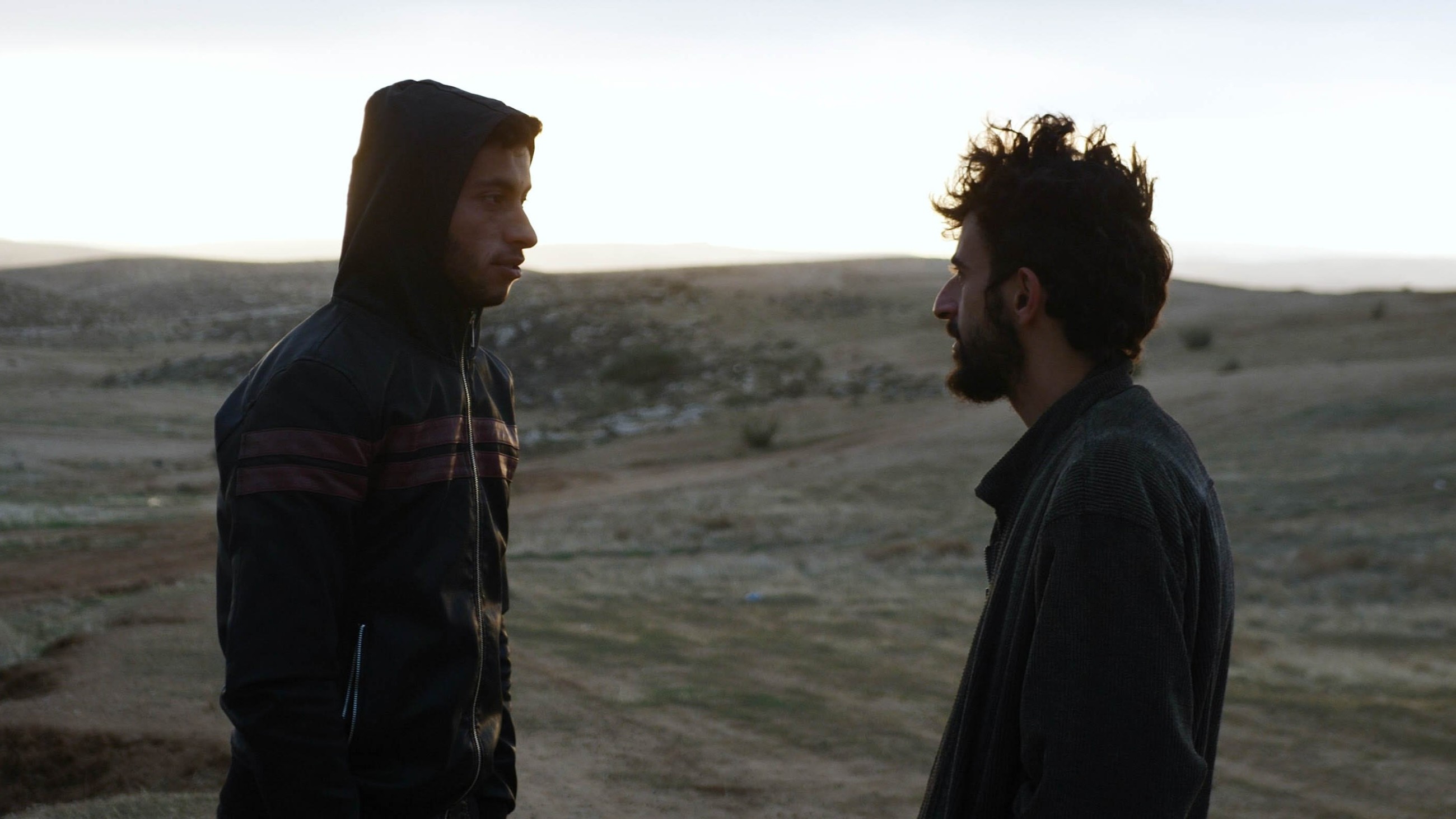
At one point in their award-winning documentary No Other Land, Palestinian filmmaker Basel Adra tells his Israeli co-director Yuval Abraham that he is too impatient to see an end to his country's occupation of the West Bank - that he believes he just needs 10 days of writing and filming and it will be over.
"Get used to failing," Adra sardonically tells Abraham, as they drive around his home of Masafar Yatta, a collection of villages south of Hebron. "You're a loser."
In 2024, 57 years into Israel's occupation of the West Bank and more than three quarters of a century after the Nakba that saw more than 700,000 Palestinians driven from their homelands, it can be harder than ever to believe yet another article, or report, or documentary could finally push the world to act.
Much of No Other Land is interspersed with video footage dating back to Adra's childhood showing his activist father squaring off against Israeli soldiers and settlers in exactly the same fashion as his son would.
Though it seems unlikely the documentary, which was shot over a period of five years ending in October 2023, will be the straw that finally breaks the occupation's back, it has certainly provoked strong reactions, both positive and negative.
New MEE newsletter: Jerusalem Dispatch
Sign up to get the latest insights and analysis on Israel-Palestine, alongside Turkey Unpacked and other MEE newsletters
Speaking to Middle East Eye from Jerusalem and Masafer Yatta respectively, Abraham and Adra said it had been a struggle to deal with the fallout from their film. "I was surprised by the reaction in Germany," said Abraham.
"I think Germany says that it is supporting Israel and the Israelis, but it's actually supporting Israelis who believe in continuing the occupation and who, in a way echo the policies of their governments."
In February, the two filmmakers won the documentary award at the Berlinale film festival - at the acceptance speech, Abraham raised the "apartheid" laws that separated he and his co-director and called for an end to the occupation.
In response, a number of German politicians denounced his comments as "antisemitic" and following that he received death threats, while right-wing mobs attacked his family home in Israel.
'I think Germany says that it is supporting Israel and the Israelis, but it's actually supporting Israelis who believe in continuing the occupation'
- Yuval Abraham
Later, Berlin's official online portal referred to No Other Land as having "antisemitic tendencies" though this was later removed.
Abraham said Germany's obsessive crack down on pro-Palestinian behaviour was making life increasingly difficult for Jews and Israelis like himself who wanted to see an end the ongoing war in Gaza.
"This simplistic vision of what it means to support Israelis or to support Jewish people... diplomatically, financially, to continue doing what we show in the film, which is to continue working to prevent a Palestinian state," he said.
"I believe that they have not only acted against Palestinians, but they have also acted against Israelis. Because I see the two people as connected. And I believe that security is always going to be a mutual endeavour."
'A story about power'
The controversy over the film's release, however, only heightened the interest for the subjects of the film, the residents of Masafer Yatta.
For decades, the Israeli authorities have attempted to evict the around 1,000 Palestinian inhabitants of Masafer Yatta, in order to create a military "firing zone", or training ground for Israeli forces.
Their home lies within Area C of the West Bank, which remains under the full authority of Israel and is littered with settlements, illegal under international law, whose inhabitants regularly harass Palestinians, vandalise their homes and vehicles and shoot them.
Adra said following the controversy in Germany he arranged for a major screening of the film in his home village.
"They really wanted to see it after all the news, because of what happened in Berlinale and the attacks on me, and on Yuval by the Israeli media and other media in Germany," he said.
"In March we did like a big screening in the community and the playground of the school - hundreds attended, journalists and a solidarity activist as well, and a lot of people from the community."
Apart from seeing their struggle on screen, Adra said the experience was very nostalgic for many of the older residents, watching old footage dug up from the 90's.
A particularly memorable moment was a visit by former UK Prime Minister Tony Blair in 2009 in his capacity as Middle East Peace Envoy. His visit at the time, watched on by Adra's sceptical-looking father, ensured a stay of execution for one of the villages in Masafer Yatta.
Adra notes in his voiceover, following the visit, "this is a story about power".
"Today, we are disappointed," he told MEE.
The images of the slaughter in Gaza are everywhere, while the occupied West Bank has also endured a ramping up of attacks by settlers and assaults by the Israeli military - including air strikes - have escalated, leaving hundreds dead.
"But yet governments like UK and the US, Germany still defend Israel, backing it and supporting it," said Adra.
"They are complicit in the occupation, the apartheid and the genocide in Gaza."
'Faith' in film making
The fight to protect their homes has been draining and costly for the residents, both financially and physically.
A central figure in the film is Harun Abu Aran, a villager left paralysed from the next down after a soldier shoots as they inexplicably attempt to confiscate a generator.
Throughout, his mother attempts to care for him and negotiate visits by curious foreign journalists from within a cave, bemoaning the substandard conditions she is forced to care for him in.
By the end of the film, Abu Aran has died from his wounds.
"Since I was a teenager, I carried the camera... to film the evidence and to show it and have it published," Adra told MEE.
He said he had held onto a "faith" that as long he kept recording and producing evidence for the world to see that eventually someone would have do something, that the US would be able to pressure Israel.
Shortly after filming ended, the 7 October Hamas attack in southern Israel took place, killing around 1,200 people and leading to hundreds of Israeli being taken captive back to Gaza.
In response, Israel has launched a devastating assault on the Gaza Strip, killing more than 44,000 people, displacing virtually the entire population and plunging the enclave into hunger, destruction and despair.
"And for the past year, watching a live genocide on our phones with all the videos coming from Gaza and the West Bank...the facts on the ground are moving to be worse and worse," said Adra.
"And the Israelis don't care about international pressure, international law because, unfortunately, the US is backing them."
Life isn't becoming any easier for Abraham either - as one of the dwindling number of Israels who support the rights of Palestinians, he has been dismayed to see the country swamped by ultra-nationalist and irredentist fervour in which no number of Palestinian deaths seems to provoke any sympathy.
"There is an Israeli left - it's not represented politically today and it's very small and it's more and more persecuted by the government. The space for criticism really shrunk since 7 October," he explained.
'The Israelis don't care about international pressure, international law because, unfortunately, the US is backing them'
- Basel Adra, filmmaker
The recent arrest warrants issued by the International Criminal Court (ICC) for Netanyahu and former defence minister Yoav Gallant were roundly condemned in Israel, not just from political allies but also opposition leaders.
Even Yair Golan, leader of the Democrats (a merger of the Labor Party and centre-left Meretz), branded it "shameful."
"People I think, especially in western countries, want to hold on to a hope that if only Netanyahu is replaced everything will be better and there will be a political solution, a two state solution or whatever," said Abraham.
"The Israeli parties are not willing to show even the most basic level of criticism towards the Israeli army, despite the highest court in the world flagging its military operations for war crimes and crimes against humanity."
An act of core resistance
Masafer Yatta continues to push back against attempts by Israel to erase it from existence. "It's our land...that's why we suffer for it," in the words of one of the residents.
The past year has seen an explosion of settler violence in the West Bank and Masafer Yatta has been no exception.

Over the weekend, settlers reportedly attacked the house of a local activist in the village of Tiwani and assaulted his family, injuring two of them.
Israeli soldiers then arrived and, instead of targeting the settlers, instead abducted the activist.
Abraham and Adra's film presents Palestine on the eve of what is arguably the greatest crisis for the Palestinians since 1967.
And with the space for Palestinian resistance shrinking in Israel, the occupied territories and - seemingly - much of the rest of the world, No Other Land is fighting an uphill battle.
"For us, the movie is an act of core resistance and we wanted to we wanted to show it as fast as we could when it was done," said Adra.
Middle East Eye delivers independent and unrivalled coverage and analysis of the Middle East, North Africa and beyond. To learn more about republishing this content and the associated fees, please fill out this form. More about MEE can be found here.


